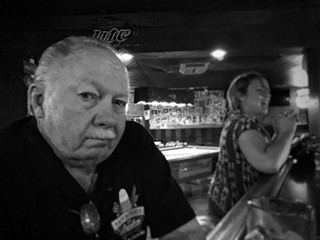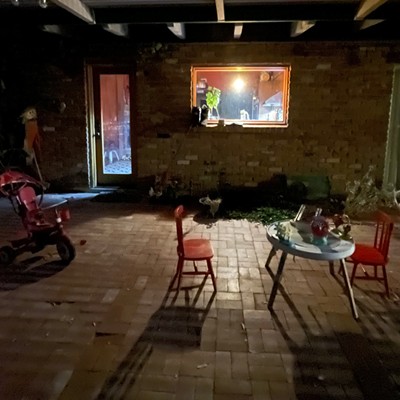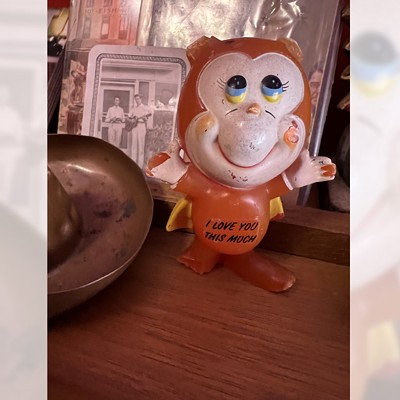We'd drive by The Bambi in the family car, and I thought it a bar where moms disrobed. The boxy façade, the curtained glass adult-shop doors, the sign's fetching logo and mule deer caricature. An ominous sanctum in which nothing good could happen, but somehow everything great. I knew it wasn't H.R. Pufnstuf. When I was a boy.
The Bambi's been here since this end of Speedway (5050 East) was dirt. "Old Man" Guy is the bar's 90-year-old proprietor. He lives nearby, appears nightly just before closing to count the till, restock the bar and feed the feral cats who prowl outback in the smoking area and gravel lot. He hangs until morning and serves coffee to other folks heading to work. Like the place never closes. Again, Guy is 90.
It's a bar forever ensconced in Tucson lore. (Think of "Hoss," a one-time regular who died more than 30 years ago while conversing inside the bar's phone booth. A skeleton's propped there to honor him. People swear Hoss haunts the place.)
Dale Roche didn't know Hoss, knows of him. It's assumed knowledge. Roche occupies a stool on the impressive, squared-horseshoe bar, and works a draft beer, one of maybe 12 other drinkers. A corner flatscreen barks baseball updates, ESPN.
Roche, who looks like Mickey Rooney at 70, nods to a section of wall photos. Aged pale and dappled, faces frozen happy. "That's the wall of death," he says. Laughs, "I might be here one day."
Roche graduated from Rincon High in '66 when Tucson's population was still south of 250,000, and "gas was 15 cents a gallon." When Dan Gates and Frank Kalil ruled KTKT-99 radio and pushed Tucson's Dearly Beloved to No. 1 with "Peep Peep Pop Pop." When serial killer Charles Schmid Jr. ("The Pied Piper of Tucson") had the entire town horrified. Roche remembers the Pied Piper; his friend dated Gretchen Fritz, one of the three teen girl victims.
"Yeah it freaked me out," he says. "We had sock hops on Saturday, and I used to see The Pied Piper at the Sunset Rollerama. Everybody knew he was strange; he was like a freak — his hair was all done up all the time, wore long coats. Beer cans in his boots to make himself taller. Make-up. But back then there was a lot of rebellion. People stood out, but who'd have thought this guy would be a crazy motherfucker?"
Roche survived Vietnam, as did his two brothers. His Navy-vet uncle didn't. He later worked blue collar in California. Returned to Tucson ("I still live in the same house we had in 1962, 20th Street and Craycroft"), became a Bambi regular, lately "about every day." His ex-Marine older brother, Eddy Roach, a former disc jockey and onetime Bambi regular, died in February. Dale had been taking care of him for five years. The Bambi hosted an "all out" memorial for Eddy.
Dozens of black-and-white caricatures of bar regulars create multiple wall displays. The artist would stare at customers, go home and sketch from memory. Roche is proud to be included. Linda Ray's there too, a beloved regular Roche dated years ago. She died.
So, yes, The Bambi's a cornerstone of local humanity. A lonely-hearts gang partial to friends in real time, guffawing, polluting livers. The living-room luxury and the warmth, its holy workingclassness.
Barroom novelties abound: a still-warm hotdog buffet. An '80s pic of regulars seated around a giant monsoon puddle in The Bambi parking lot, pretend fishing. A backlit beer clock whose hands aren't dead, its yellowed, dusty face reads "BAMBI" where it should "Hamm's."
There isn't a soul here not saddened that Tucson dens like The Bambi recede while cold micro-brews and ersatz speakeasies rise. Moneyed places serving fruity cocktails and coffee'd whatevers to over-paying "urban pioneers" who use the adjective "creative" as a self-referencing noun. Good thing this lounge sits miles from downtown Tucson and anything called a bistro or brewery. "I hear it's nice," Bartender Susie Williams says unironically of downtown. "I haven't been there in years."
Susie's like that cool mom who'd let you and your friends drink beer in the backyard because she knew you'd drink the 10th grade summer away anyway. Converses with cheerful, fitful amusement, busy yet outwardly curious about people. It's like she forgets she's a bartender and settles into the person she is. It's easy to feel worthy in her purview.
Susie was 11 when her homemaker mom died. At 16 she arrived alone in Tucson after scamming a Greyhound ticket back home in Indiana. Had four bucks in her pocket. Nothing against her old man, a plumber, and her siblings, but a boy had captured her heart. He stole a car, broke probation and avoided jail by moving to his mother's Tucson home. "Honey, I didn't know my ass from a hole in the ground," Susie says. "But on the way out here, I should've gotten my period and I didn't. I was in love. Also, he was kind of a rebel."
A teen wedding ensued. The hard-partying hubby died at 42. Their child, Serena, is now 42. "It was terrible," Susie says. "Lived fast, lived hard, died young. What do you do with people like that?"
Hired eight years ago here, Susie logged in 12 years prior at The Mint lounge on Grant Road. Daughter Serena worked The Mint before mom. Incredibly, Serena's own daughter is 22, which is one year older than Susie's youngest son. Susie and her daughter raised their children together.
Susie explains: "I was a grandmother at 37, and then my youngest son was born when I was 38. So, I have a granddaughter a year older than my youngest son. They grew up like cousins."
Susie has slung drinks for three decades. Her second husband owned JW's Lounge at First and Fort Lowell, where she honed her skills. They had a son, now 32. "My second husband was 20 years older than me." She pauses. "Both of my husbands are dead, and I'm still goin'. I wasn't together with him or the first one when they died."
On marriage: "I'm not doing that shit any more. I'm together with the father of my third child. We're as married as anybody. Life goes on."
Elsewhere in Bambi, a pole-thin black gent with a severe limp and cane, and a starched white button-down shirt, mutters softly. He has no interest in talking or having his photo snapped. Susie's seen him in here once or twice, maybe.
He fascinates — it’s his uncommon Sunday-sermon grace. A whorehouse priest. Granite cheekbones, tattered formality. Like slow motion he wraps long fingers around glass, lifts from bar to lips, sips. He lowers glass gently to the bar. Counts his money, carefully places crisper bills on top, a neat pile. Arranges the napkin alongside, symmetrical. Lulled, glassy dark eyes fixed straight ahead. So alone. The last place on Earth—tonight, at least. He's tuned to the same frequency as the others here. Conversations roll one end into another. There are no secrets. He listens.
Dale Kiernan listens too.
His shape on the barstool next to me: curved back, heavy knuckles, healthy paunch. His Y&T T-shirt a love-nod to the metal of his Wyoming youth. Nods and laughs whenever he says a disparaging thing about himself, which is often. He's a chef at Tucson's Senae Thai, but I'd never mistake him for a guy floating on executive chef bravado, that certainty he can do what he wants. Nothing dull or tedious about him.
Working a vodka and ginger ale, he talks freely of his heroin addiction, rip-off rehabs, alcoholism and culinary delights. Speaks of geohydrology, working oil fields and his anthropology degree from University of Wyoming. How he switched to kitchens after culinary school in Oregon. ("It's not like you get out of culinary school and land a sexy job. I went to work on a Greek food truck.")
He spent months preparing food on a fair circuit and "a religious deal in Boise." He's worked kitchens in California, Colorado, Utah, Wyoming too — landed at Tucson's only five-diamond restaurant, the ill-fated Ventana Room.
Like any chef I've ever known, his capacity for toxins is impressive. He wound up strung out on heroin with Jennifer, a junkie prostitute, and was kitchen-manager at Ten's, the gentlemen's club a spitting distance from here. ("That was during my fall,” he says. "But the food was great when I was there.")
He landed in rehab. Jennifer's in jail.
Susie wanders over, pours Kiernan a fresh vodka, wipes the bar, listens. Adds, "You dive into a bottle of anything you're going down fast. I have nothing against drinking — I love my whiskey. But it doesn't agree with some people. I have a son who's just like his father. It takes all kinds to make this world. No better do you learn that than in the bar business."
Kiernan agrees. "I've been a coke snorter for 30 years. I taught myself how to cook crack. But smoking heroin is what took me down. My mom was out-of-pocket $17K to send me to rehab in 2015."
I ask how Kiernan can still drink.
"Control," he says.
"Amazing."
Moments, maybe minutes, pass. Then Kiernan says, "Luckily I moved close to The Bambi. Other than The Bambi, I had no desire to stay in Tucson."
Jesse Salazar works a cigarette at a table in the outside smoking lounge. A good talker. His English rings with Spanish and hip-hop burrs in a musical patois. A regional dialect I've only ever heard in the Southwest. He grew up on hip-hop and its magazines The Source and XXL, moving back and forth between Nogales, Arizona, and Tucson. He played guitar (but, he insists, nowhere near as a good as his brother) in makeshift Nogales jam outfits that'd set up regularly in their front yard, blasting till the cops showed. He's 34 but looks 20.
He Pedestalizes his mother, for good reason; herculean efforts raised Jesse and his four sibs. Mom was pregnant with her last child while the family lived in a Nogales homeless shelter. She went back to school with five kids and no money and became a paralegal. His PTSD-suffering Nam-vet dad, who Jesse has only met "a couple of times," was a family no-show. Jesse recently learned dad had a stroke. He knows that much. And mom suffered a massive heart attack several years ago, and she’s weak now. He drops his head; "I'm not shit compared to her."
He calls himself an underachiever who knows the streets. Works as a "floor technician" at Santa Rosa, a nursing care center. He may not realize the work seems life affirming. "I can dress the title up anyway I want to," the floor tech says. "But I buff floors."
He talks of one patient there named Jeffrey. A guy dying in a wheelchair with a colostomy bag. "Not that old," Jesse says, "Like 50."
But this guy Jeffrey could move two fingers. "So he'd put his paintbrush between his thumb and forefinger, and he would paint. And I supported him in his thing. He watched Bob Ross videos and things like that. You know, 'happy little trees.' It was heartbreaking, man 'cause I would see him every day, and he told me real stories about how his wife got into crack. He had a cool New York accent. Eventually, he ended up calling me his kid brother."
One day Jesse was mopping up the hallway at the Santa Rosa, "'cause, you know, I'm a floor technician. Jeffrey told me to close my eyes. So I followed him into his room, and he displayed a picture he painted for me, a landscape of a beach, with shrubbery and mountains off to the sides. Done with just his index finger and his thumb."
There was no gesture anyone could've done or said for Jesse and Jeffrey that would've said more than that painting. Soon Jeffery died, and the picture now hangs in Jesse's apartment. Jesse was the only non-nurse who'd visit Jeffrey.
"Even if he was an asshole, don't you think someone would show up to visit him? It would really fuck with me if I got to know these people and then watch them pass away. It's happened so many times. Jeffrey stands out though, 'cause he called me his kid brother. And then when he died — it's like I would love to beautifully describe this — but all I can say is fuck."
Jesse has a friend here tonight who steps out back to the smoking area, wonders if Jesse is still into playing pool. Jesse stands to join him inside. He stops, turns back and says, "Sometimes you see people, and you're the only person they see —they're daughters of daughters of daughters. I've seen body bags wheeled off after some die, and it's so sad." He puts his cigarette out. "I bet if Jeffery was still alive, he'd want to go out. It makes me want to go out and live life."
[
{
"name": "Air - MedRect Combo - Inline Content 1",
"component": "29441156",
"insertPoint": "1/3",
"requiredCountToDisplay": "9",
"parentWrapperClass": "fdn-ads-inline-content-block"
},{
"name": "Top Stories Video Pair",
"component": "27651162",
"insertPoint": "10",
"requiredCountToDisplay": "1",
"parentWrapperClass": "fdn-ads-inline-content-block"
},{
"name": "Air - MedRect Combo - Inline Content 2",
"component": "29441158",
"insertPoint": "2/3",
"requiredCountToDisplay": "10",
"parentWrapperClass": "fdn-ads-inline-content-block"
},{
"name": "Air - MedRect Combo - Inline Content 3",
"component": "29441159",
"insertPoint": "1000",
"requiredCountToDisplay": "15",
"parentWrapperClass": "fdn-ads-inline-content-block"
}
]
















